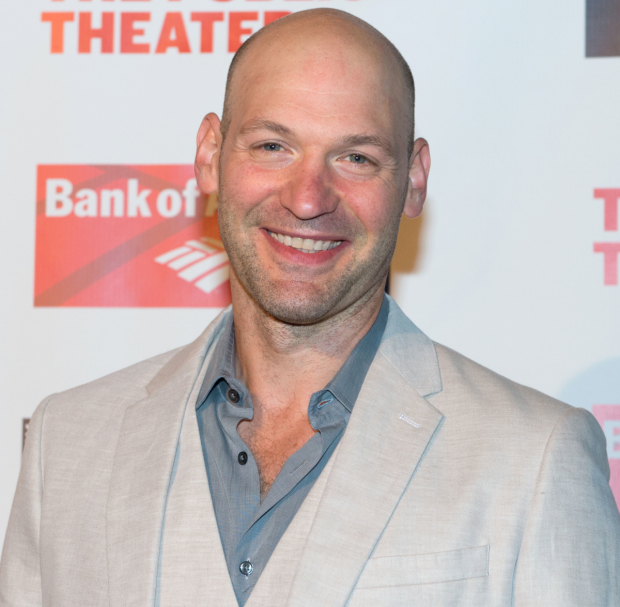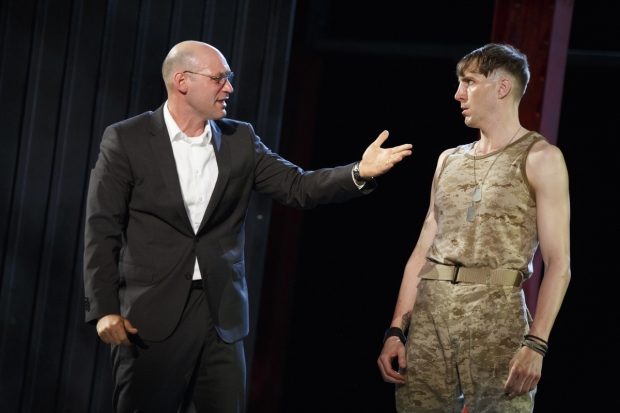Corey Stoll Spends "Plenty" of Time at the Public Theater
When theater people think of Corey Stoll, they imagine his Drama Desk Award-nominated turn as fabric seller Mr. Marks opposite Viola Davis in Lynn Nottage's Intimate Apparel. When film buffs imagine Stoll, they see his ferocious yellow-and-black suit as Yellowjacket in the recent superhero movie Ant-Man. Stoll is a chameleon of an actor on stage and screen, and frequently goes back and forth between the two mediums.
Of late, Stoll's résumé has been filling up with television and film appearances. Among them, 12 episodes and a Golden Globe nomination for his work as Peter Russo on House of Cards, the leading role of CDC Canary Team head Dr. Ephraim Goodweather on The Strain, and Ernest Hemingway in Woody Allen's Midnight in Paris.
This summer, Stoll returned to the stage with the Public Theater's free Shakespeare in the Park production of Troilus and Cressida, playing Ulysses as a suited political operative unafraid to take matters into his own hands. But Stoll isn't saying farewell to the Public so quickly. His next gig, down at its home on Lafayette Street, is David Leveaux's revival of David Hare's seminal 1982 drama Plenty, opposite Rachel Weisz. Was it fate? Perhaps. But Stoll sees it simply as "making up for lost time."

(© David Gordon)
Between Plenty and Troilus and Cressida, you're doing two Public Theater productions back-to-back. Was that planned or serendipity?
[laughs] Maybe a little bit of both. I've wanted to work with the Public since I was ten years old. It's hard to believe that I hadn't, so I'm making up for lost time, I guess.
Were you familiar with Plenty before starting this process? Did you ever read it or see it?
I didn't. I had been a huge fan of David Hare's, but it very famously hasn't been produced in New York since it originally was. I knew there was a production with Cate Blanchett in London a few years ago. There had never been a production in school or even scene-study class. I'm not quite sure why not. Maybe because it's really tough. But it's a remarkable play.
What's tough about it?
It's a beautiful and dense play that's really challenging for the actors. The closest thing I can recall, in terms of the difficultly level, is Ibsen, where there's so much there to unpack. You always feel like you're missing something, and that the author has left you breadcrumbs and clues to what's actually happening. That's what's really exciting about it. There are so many opposing things going on every minute. It can be daunting how much you're missing.
Has David Hare been involved very much?
He came by for a couple days, giving a lot of historical context for the play. For instance, the Suez crisis plays a big role in one of the scenes, and it was something that I had never heard of, I'm a little embarrassed to say. For Brits of a certain age, it was their Watergate and Bay of Pigs all wrapped up in one.

(© Joan Marcus)
What are the differences between rehearsing a work like this, which has a lot of psychological intensity, and rehearsing a piece like Troilus and Cressida, which is very physical on the exterior?
There's a scale to any Shakespeare, and a scale to the size of the cast and the size of the stage, that requires a very regimented rehearsal process. This is much more interior. Physically, Troilus is about as exterior a play as you can get. We're on a battlefield, and [with Plenty] we are in people's private spaces. There's a lot of politics in it. It's about how the individual operates in a political sphere.
Do you miss doing theater when you're working on film and television?
I miss whatever I'm not doing. It's been so great to have this extended period of time where I get to do two plays in a row. And when this one ends, I'll be ready to go back to the TV show [The Strain], and when that's done, I'll probably very be very excited to do a movie or another play. Just in terms of lifestyle, doing a play means being able to sleep in my own bed, have a somewhat predictable schedule, and be in the same city as my family, which is obviously a huge perk.
Are people recognizing you on the street now after high-profile gigs like House of Cards and The Strain and Ant-Man?
It goes in waves. I love riding the subway, but sometimes I can feel a little bit of a captive audience. I actually have been riding my bike everywhere, and it's the best warm-up, I find, for rehearsal and performance. It's physical, you get your body working and your lungs moving. But also kinesthetically, in terms of spatial awareness, the enormous amount of stimulants you have to react to in order to not die on your way to work really wakes one up in a way that can make you ready to perform.











